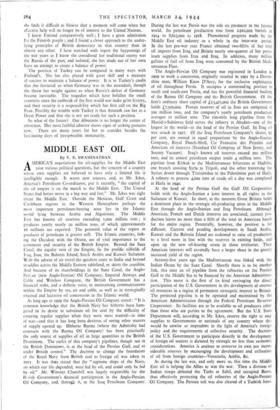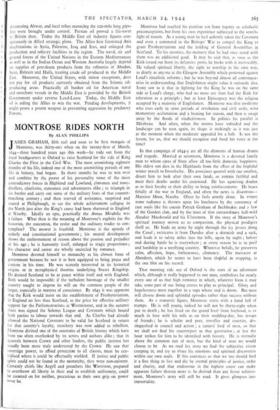MIDDLE EAST OIL
By V. S. SWAM1NATHAN
AMERICA'S negotiations for oil-supplies for the Middle East raise various political questions, but the concern of a country whose own supplies are believed to have only a limited life is intelligible enough. It wants new sources, and, as Mr. Ickes, America's Petroleum Co-ordinator, put it recently, " the capital of the oil empire is on the march to the Middle East. The United States had better move in a big way and fast." Mr. Ickes was right about the Middle East. Outside the Mexican, Gulf Coast and Caribbean regions in the Western Hemisphere perhaps the most important petroleum-bearing zone lies in the Islamic world lying between Arabia and Afganistan. The Middle East has known oil reserves exceeding i,000 million tons ; it produces yearly nearly zo million tons, of which approximately 16 millions are exported. The potential value of the region as producer of petroleum is greater still. The Islamic countries, link- ing the Occident with the Orient, are of vital importance to the commerce and security of the British Empire. Beyond the Suez Canal, the jugular vein of the Empire, lie the prolific oilfields of Iraq, Iran, the Bahrein Island, Saudi Arabia and Kuwait Sultanate. W.th the advent of air travel the quickest route to India and beyond straddles across the Middle Eastern tableland, or skirts the coastline. And because of its shareholdings in the Suez Canal, the Anglo- Pers:an (new Anglo-Iranian) Oil Company, Imperial Airways and Cable and Wireless Company, the British Government has a financial stake, and a definite voice, in maintaining communications within the Empire by sea, air and cable, as well as in strategically situated and lucrative oil concessions in the Islamic world.
As long ago as 1909 the Anglo-Persian Oil Company stated: "It is common knowledge that the British Navy has hitherto been ham- pered in its desire to substitute oil for coal by the difficulty of ensuring regular supplies when they were most wanted—in time of war—and that it has long been desirous of seeing other sources of supply opened up. Hitherto Burma (where the Admiralty had contracts with the Burma Oil Company) has been practically the only source of supplies of oil in large quantities in the British Dominions. The outlet of this company's pipelines, though not in the British Dominions, is at the head of the Persian Gulf, and VS under British control." The decision to change the foundation of the Royal Navy from British coal to foreign oil. was taken in 1911. It was then stated that the " supreme ships of the Navy, on which our life depended, were fed by oil, and could only be fed by oil." Mr. Winston Churchill was largely responsible for the British Government's financial participation in the Anglo-Persian Oil Company, and, through it, in the Iraq Petroleum Company. During the last war Persia was the sole oil producer in the Islamic world. Its petroleum production rose from 2,91o,000 barrels in 1914 to 8,623,000 in 1918. Phenomenal progress made by the Middle East oil industry as a whole in the inter-war, period. In the last pre-war year France obtained two-fifths of her total oil imports from Iraq, and Britain nearly one-quarter of her petro- leum supplies from Iran and Iraq. In addition, many million gallons of fuel oil from Iraq were consumed by the British Medi- terranean Fleet.
The Anglo-Persian Oil Company was registered in London in 1909 to work a concession, originally secufed in 1901 by a Devon- shire man; William Knox D'Arcy, for the exclusive exploitation of oil throughout Persia. It occupies a commanding position in south and south-east Persia, and has the powerful financial backing of the Burma Oil Company and the British Government. Of the firm's ordinary share capital of L13,425,000 the British Government holds £7,5oo,000. Proven reserves of oil in Iran are computed at Soo million tons, and the company's yearly petroleum production averages II million tons. The izo-mile long pipeline from the Masjid-i-Sulaiman field serves the refinery at Abadan—one of the largest in the world—at the had of the Persian Gulf. In Iraq oil was struck in 1927. Of the Iraq Petroleum Company's shares, 95 per cent. are owned in equal proportions by the Anglo-Iranian Company, Royal Dutch-Shell, Cie Francaise- des Petroles and American oil interests (Standard Oil Company of New Jersey, and Socony Vacuum). Iraq's known oil reserves exceed 200 million tons, and its annual petroleum output totals 4 million tons. The pipeline from Kirkuk to the Mediterranean bifurcates at Haditha, one branch crossing Syria to Tripoli, and the other traversing the Syrian desert through Transjordan to the Palestinian port of Haifa. A refinery to process 4,000 tons of crude oil a day was completed at Haifa in 194o.
At the head of the Persian Gulf the Gulf Oil Corporation holds with the Anglo-Iranian a joint interest in all rights in the Sultanate of Kuwait. In short, at the moment Great Britain holds a dominant place in the strategic oil-producing areas in the Middle East through the Anglo-Iranian and Iraq Petroleum. Although American, French and Dutch interests are associated, current pro- duction leaves no more than a fifth of the total in American hands for the entire region. Potentially, however, the position is far different. Qirrent and pending developments in Saudi Arabia, Kuwait and the Bahrein Island are reckoned to raise oil production to a level more in line with the reserves in existing fields, and open up the new oil-bearing strata in those territories. Then American interests will assuredly have a larger share in the greatly increased yield of the region.
Seventy-five years ago the Mediterranean was linked with the Indian Ocean by the Suez Canal. Shortly there is to be another link, this time an oil pipeline from .the refineries on the Persian Gulf to the Middle Sea to be financed by the American Administra- tion. This move • is the first of its kind envisaging the direct participation of the U.S. Government in the development of oversea oil resources in a region of permanent strategetic interest to Britain. The projected pipeline is to be operated and maintained by the American Administration through the Federal Petroleum Reserves Corporation. Its facilities are to be available to oil producers other than those who are parties to the agreement. But the U.S. State Department will, according to Mr. Ickes, reserve the right to stop supplies to Governments or nationals of any country where this would be unwise or imprudent in the light of America's foreign policy and the requirements of collective security. The decision of the U.S. Government to participate directly in the development of foreign oil sources is dictated by strategic no less than economic considerations. America is anxious to conserve its own not incon- siderable reserves by encouraging the develOpment and utilisation of oil from foreign countries—Venezuela, Arabia, &c.
As during the last war, and only more so, this time the Middle East oil is helping the Allies to win the war. Then a division of Indian troops .defeated the Turks at Sahil, and occupied Basra, thus effectively protecting the oil refineries of the Anglo-Persian Oil Company. The Persian soil was also cleared of a Turkish force threatening Ahwaz, and local tribes menacing the no-mile long pipe- line were brought under control. Persian oil proved a life-saver to Britain then. Today the Middle East oil industry figures con- spicuously in Allied strategic plans. The Allies first frustrated Axis machinations in Syria, Palestine, Iraq and Iran, and enlarged the production and refinery facilities in the region. The naval, air and ground forces of the United Nations in the Eastern Mediterranean as well as in the Indian Ocean and Western Australia largely depend• on supplies of petroleum products from the refineries of Abadan, Suez, Bahrein and Haifa, treating crude oil produced in the Middle East. Moreover, the United States, with minor exceptions, does not pay for oil products currently obtained from the Islamic oil- producing areas. Practically all bunker oil for American naval and merchant vessels in the Middle East is provided by the British Government under reverse Lend-Lease. Today, the Middle East oil is aiding the Allies to win the war. Pending developments, it might prove a potent weapon in preventing aggression by predatory Powers.



























 Previous page
Previous page